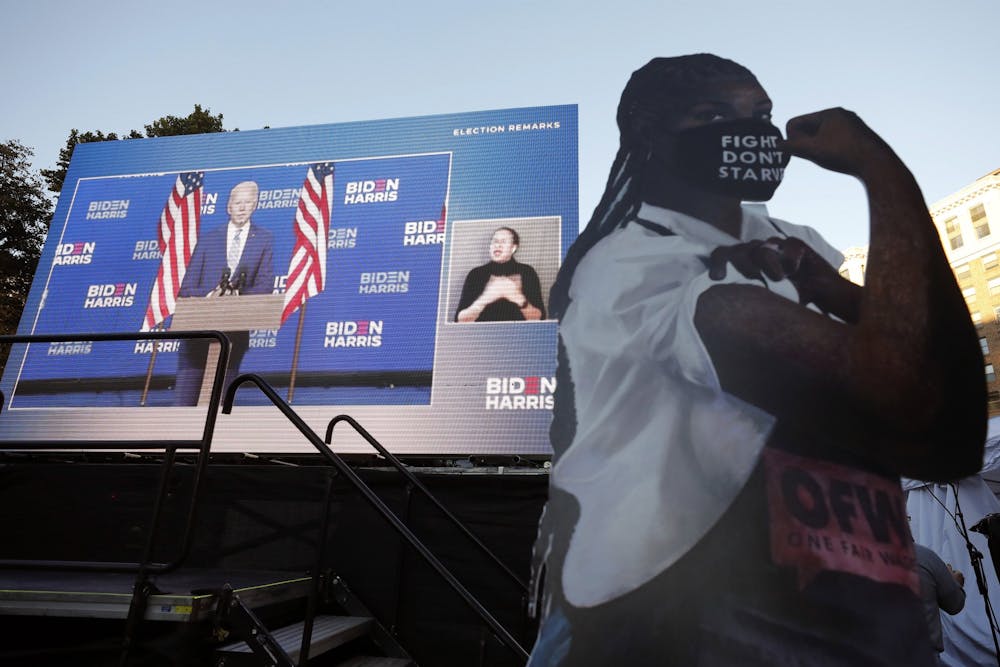The 2020 presidential election brought the highest level of voter turnout in 120 years, yet Election Day proved to be anything but the blowout Democrats expected.
The odd trends, most notably President Donald Trump’s popularity among Latinx voters and the progressive referendums passed by red states, underscore the new political world we live in. Without greater class solidarity, our current game of identity politics will leave society gridlocked from substantive reform. Failure to overhaul the system will leave us no choice but to helplessly watch the fabric of social order unravel before our eyes.
Trump fared especially well with Latinx voters despite his harsh immigration policies and tendency to dehumanize immigrants through verbal insults.
Starr County, Texas, shares a border with Mexico and its population is 96% Hispanic. Former Vice President Joe Biden won the county by five points whereas former Democratic presidential candidate Hillary Clinton had a 62-point advantage over Trump in 2016.
Miami-Dade County in Florida has a 70% Hispanic population. Biden won by seven points in Miami-Dade compared to Clinton’s 30 points.
Why are Latinx voters siding with a president who actively slanders them?
There is a much deeper disconnect in America than we were willing to acknowledge over the past four years. Black voters historically tend to be reliable Democrats because of the way they experience racism in America. The same can not be said for Latinx individuals. Nevertheless, Trump managed to increase his share of the Black vote as well.
The Democratic party is unwilling to differentiate between the racial experiences of different minority groups and the effects are debilitating. They treat the minority vote as expendable.
Even more interesting, states across the nation where Trump emerged victorious paradoxically supported progressive ballot measures.
Montana legalized recreational marijuana with the support of 57% of Montanans. Trump received a nearly identical share of the vote. 53% of South Dakotans also voted to legalize marijuana.
Florida passed a referendum to incrementally raise the minimum wage to $15 per hour. More than 6.3 million Floridians voted in favor of the measure. Trump won Florida with only 5.6 million votes.
Why are red states passing ballot measures typically supported by progressives, some with more votes than Trump garnered?
The corporate elites succeeded in orchestrating an indefinite civilian dog fight. We rally behind party representatives, treating them like prophetic entities as they order us to viciously maul the opposing side. They trained us to fight, and now we foam at the mouth with the mere thought of our next opportunity. Our handlers offer us praise in return for our efforts, which endows us with immense gratification.
We, as a working class, lost sight of our commonalities and instead use politics as a vehicle for pursuit.
The election proved the futility of polls and subsequently that 2016 was not a fluke. Humans are by nature irrational. It is baseless to apply a rational metric, like polls, to predict irrationality. But we rely on polls as a form of entertainment. They evoke a sense of urgency and soothe us in times of despair. They prove meaningless when Election Day rolls around.
There is a greater misconception that politics is political theater solely for the average Trump supporter — they enjoy making the “liberals cry.” I was guilty of adhering to this belief.
In reality, national politics through the eyes of elected officials is akin to wagering on the Kentucky Derby. More than half of the current members of Congress are millionaires. Figures like Michael Bloomberg can dump well over $800 million into a failed presidential bid and leave unscathed.
The most sadistic part is we derive pleasure from the dog fight. Politics is a sport for the rich, but it simultaneously became entertainment for the working middle class.
You may reject this hypothesis altogether, insisting you do not treat politics as a game. Or perhaps you think of a politician like Sen. Bernie Sanders, I-Vt., who is dedicated to fighting corporate interests.
None of this is to suggest the issues we deal with are not real, because they certainly are, or that all politicians are thereby evil.
Whether consciously or not, we are all guilty of using politics as a vehicle for pursuit. Protesting and garnering attention from elected officials rewards us with a sense of purpose. Arguing with your racist aunt on Facebook gives you a sense of moral superiority.
Perhaps it is necessary for us to derive a sense of fulfillment from politics to remain engaged.
But we must adopt a greater sense of class solidarity and refrain from worshipping political parties as if they are breathing entities. We have to acknowledge the dire toxicity of oligarchic two-party rule and put an end to the false dichotomy we create for ourselves at the ballot box. Otherwise we will aid in our own demise, creating a society consisting only of the masters and the chattel.
Katelyn Balakir (she/her) is a junior studying policy analysis and world political systems. She is a member of Indiana Model United Nations.






